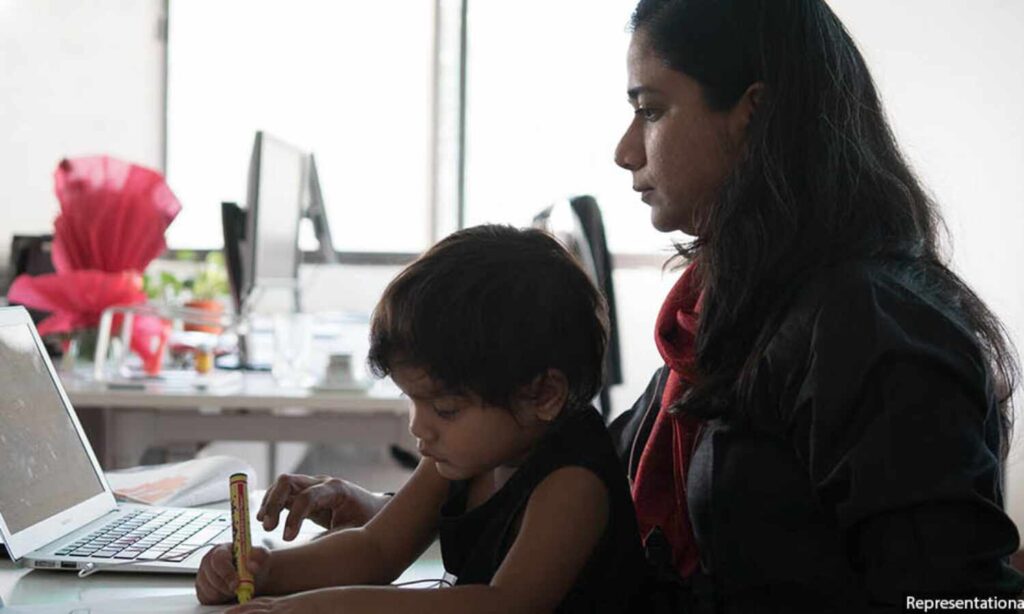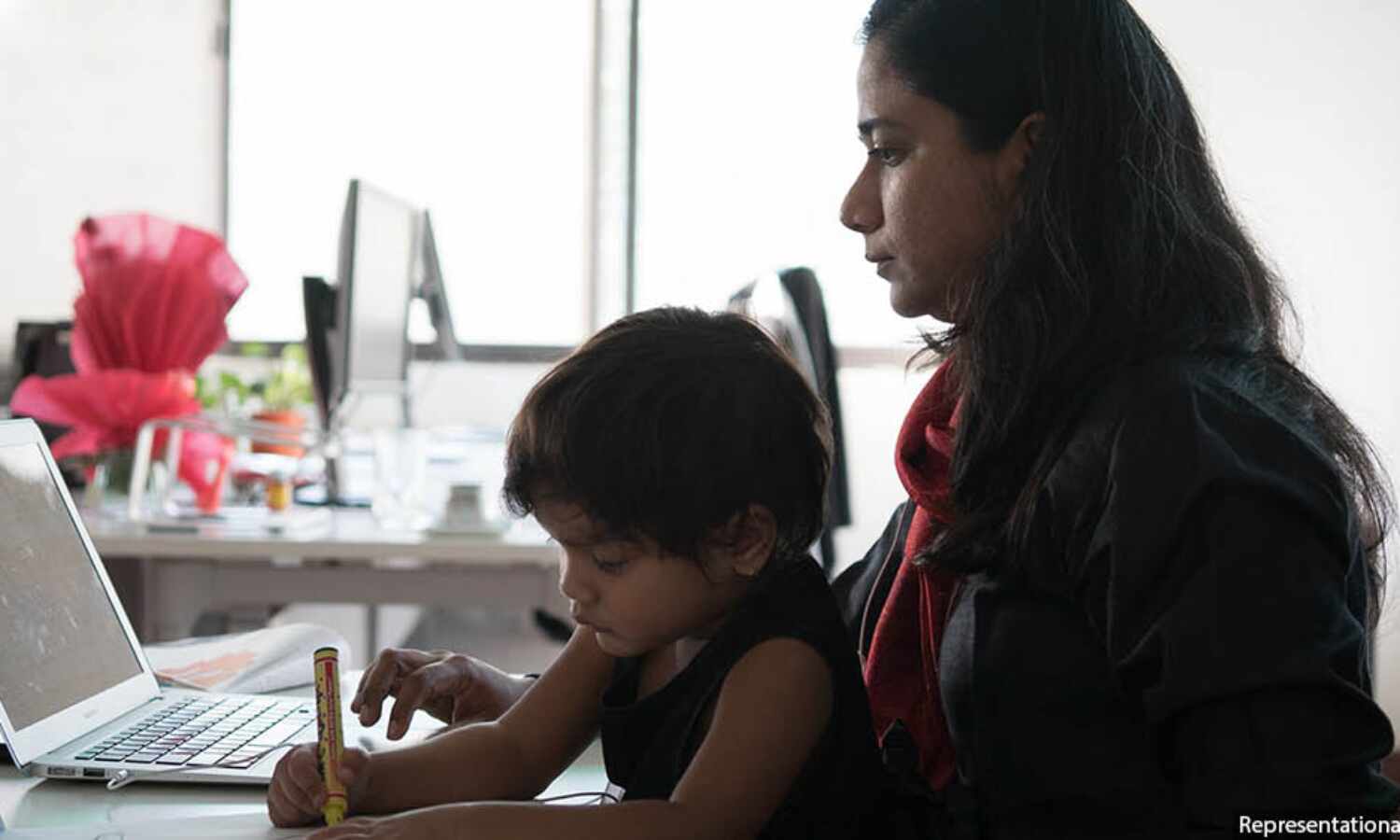
My daughter turns two soon. It is a joyous occasion. I longed to become a mother and have found it deeply rewarding in the emotional, intellectual and spiritual realms. However, it opened my eyes to peculiar forms of discrimination and deprivations on different fronts- labour, monetary, and time. It was difficult to miss the sexist and gender-based expectations that were sometimes explicitly, but often implicitly imposed on me as a “mother”. The sociology student in me was amused at how my new role as mother changed intra-household dynamics and also in larger networks of family, friends and academia.
I was pregnant when I enrolled for higher education in a graduate school at one of the premier universities in India. Owing to the pandemic and restructuring of academic guidelines in the New Education Policy, the course I had applied for and got selected for took copious time to begin. I lived in a different city than the university, but since the courses were to be conducted online, I decided to enrol. The fellowship that supported this academic pursuit allowed for eight months of paid maternity leave which provided the sort of financial aid that I imagined would ease my monetary concerns. The actual experience would prove to be otherwise.
When the course began, I was a reasonably good student with a decent academic track record. The professors seemed to encourage me to pursue ideas and showed faith in my ability to articulate ideas and explore potential topics of research imbibing a sense of confidence in myself as a serious enough academic scholar. However, my classroom experience had little bearing on my engagement with the administrative machinery of the institute. Thanks to the pandemic, all lectures and admission-related work happened over emails, phone calls and Zoom meetings.
The registration and admission procedure began in November 2020. However, receiving the fellowship that I hoped to support my endeavour turned into a nightmare of an experience. Repeated follow-ups regarding the stipend met with obfuscated responses. During the thick of the pandemic, the office staff worked from campus only a few days a week. So, if you were lucky, your calls would be answered. The responses were not necessarily courteous or helpful, but one could only try and persuade the staff to help you in that way. In one of the particularly frustrating moments when I had to seek help from a higher authority to look into the matter, the staff member felt the pressure from their superior and called to bully me over the phone to remind me that ‘I was a student and must behave as such’. It took ten whole months before I received my first stipend.
It was a challenging experience for me to pursue a dream opportunity to study at a prestigious university with excellent professors, despite the pandemic and pregnancy both of which made it unique. It was difficult to maintain enthusiasm without timely financial support as well as the languishing experience of learning through a two-dimensional screen. While I almost completed the first year of coursework before going on maternity leave, I received calls during the maternity leave asking when I would complete the rest of the coursework, adding to the mental strain of coping with post-partum health. It left me feeling the pressure to prove my competence under the new personal circumstances.
I wondered if it was because I was a ‘student’ without steady employment that I found myself in a precarious positionality. But similar difficult experiences of balancing motherhood and career have been echoed by two women from extreme ends of the organisational hierarchy in different academic institutions in India. An Associate Professor with over 18 years of teaching and research experience across the globe with a PhD from an Ivy League University had to move continents and give up a prestigious opportunity in Europe and move back to India due to a lack of adequate child care support during the pandemic. Even her work in India has not been less than difficult and she has come close to quitting the job on account of the very demanding schedule of child care while working in a private university. In another instance, a grade two stenographer in one of the premier education institutes in India was left with no choice but to resign after having a child because she did not get an extension on her maternity leave, despite working for more than a decade at the institute and literally until the day of delivery. Despite the option of working from home, she could not opt for flexibility because of the systemic gendered division of domestic labour that left her in time-poverty unable to work with an infant at home.
Motherhood Penalty is understood as the gender wage gap between working mothers and non-mothers as well as fathers. A working mother may suffer a ‘wage penalty’ per child that can go up to a 5% loss of income. Studies in the United States of America show the relationship between gender and wage gap owing to a women’s parental status (Correll, Benard, & Paik, 2007) (Crtittenden, 2002) (A.Kmec, 2011). A study on the motherhood penalty in German academia shows the differential publication rate between fathers and mothers accounting for the “adverse effect of children on productivity” indicating women publish less than men after having children (Lutter & Schröder, 2019).
Perhaps it would be useful to consider the gendered role conflict working women experience and embody as both mothers and employees, along with other social roles they are expected to fulfil. Role conflict is understood as the conflicting ideals placed on an individual owing to the multiple statuses they occupy in society. A ‘good employee’ is expected to prioritise work, not have a demanding personal life, be willing to work long hours, not take leaves and be ready to travel at a moment’s notice. A ‘good mother’ on the other hand exists to serve the needs of her child, be the primary or sole caregiver, and look after the well-being of the family members. The gendered division of labour places the woman at home, in the domestic sphere. A man is supposed to be a provider and the ‘breadwinner’. Women’s engagement with the public sphere and the market disrupts the gendered division of work and space that creates new forms of role conflict and strain on working mothers.
Indian women reflect the ‘emblematic coexistence of the contrasting modern and traditional values (Chaudhuri, 2012). While they are expected to bear traditionally valued domestic skills such as cooking and awareness of religious rituals, they must also be educated and employable (ibid, p. 282). Studies done in India acknowledge the dual role of women as mothers and being gainfully employed as “dual careers” since both are effectively full-time jobs (Gani & Ara, 2010). The role conflict emerging from the said dual career has been reported to result in mental health issues such as depression job dissatisfaction, and a desire to discontinue working outside the home (Evendrou et. al. 2002 in Gani & Ara, 2010).
In India, the correlation between a women candidate’s parental status in enrolment and completion of higher education is relatively unexplored. Though measures such as maternity leave, flexibility in transferring admission to another university in case of migration and fellowship support to women PhD holders until they find employment are meant to encourage more women to pursue academics, the practices at the institutional level make it difficult to continue education in the face of uphill battle stemming from gendered division of domestic labour, lack of adequate childcare support, irregular stipend and lack of flexibility in the working environment. Perhaps, this entry would encourage a conversation around the ‘motherhood penalty’ in Indian Academia that helps other women articulate their experiences and help in framing gender-inclusive policies.
References:
A.Kmec, J. (2011). Are motherhood penalties and fatherhood bonuses warranted? Comparing pro-work behaviours and conditions of mothers, fathers, and non-parents. Social Science Research, 444-459.
Chaudhuri, M. (2012). Indian “Modernity” and “Tradition”: A Gender Analysis. Polish Sociological Review, 281-294.
Correll, S. J., Benard, S., & Paik, I. (2007). Getting a Job: Is There a Motherhood Penalty?. American Journal of Sociology, 1297-1339.
Crtittenden, A. (2002). The Price of Motherhood: Why the Most Important Job in the World is Still the Least Valued. Henry Holt and Company.
Gani, A., & Ara, R. (2010). Conflicting Worlds of Working Women: Findings of an Exploratory Study. Indian Journal of Industrial Relations, 61-73.
Lutter, M., & Schröder, M. (2019). Is there a Motherhood Penalty in Academia? The Gendered Effect of Children on Academic Publications. Retrieved from Max Planck Institute for the Study of Societies: https://ideas.repec.org/p/zbw/mpifgd/192.html
***
Krithika Narayanswamy’s research interests include gender, politics and governance. You can reach her at krithika.n.iyer@gmail.com.

This paper should indeed be an eye opener, and calls for Policy makers and Academia leaders in Indian Universities to streamline administrative processes could make the life of a Research Scholar a lot better. This is very basic.
‘the correlation between a women candidate’s parental status in enrolment and completion of higher education is relatively unexplored’ – This is alarming and a clarion call by the author for action.
Could highly identify with the views of the writer. Being a mother and pursuing a career at the same time is an enduring task. Our academic system, employers and administrators need to see beyond the thought that bearing a child is ‘her’ problem. Existing maternity benefits should be upgraded in line with challenges emerging out of changing social dynamics where women are breaking gender stereotypes.
Coming on the back of my own research on employed couples in Kolkata, two things I would like to add regarding motherhood penalty – One, work from home is being demanded by the care giving parent, usually women which needs to be voiced more in policymaking as mentioned here. In jobs where work from home is possible, policy should aim to facilitate that for those who have care giving responsibilities. Second, there is a need for institutional set up for child care like creche. Regarding the second point I would like to add that policy makers must ensure that every organization in India have their own operational creche. The child care burden during work hours must be shared by the organizations instead of the aged in laws/parents/nurse maid which is usually the case for the middle class work force.
Dr. Sanhita, thank you for raising both these points. If working mothers and caregivers received childcare support, we would find better health outcomes and increased participation of women in the labour force.
This compelling exploration into the domain of maternity scholarship unveils a significant observation: the reality that encompasses this field is broad and almost universally acknowledged by those within it, with only a few exceptions. The review underscores a pressing need for a paradigm shift or the introduction of a new lens through which this subject can be studied and understood. It calls for a heightened level of awareness and engagement from the guardians of higher education, suggesting that the current discourse is ripe for reevaluation and expansion. Such a call to action not only emphasizes the critical importance of maternity studies within the academic landscape but also points to a broader necessity for inclusivity and diversity in scholarly approaches. This review, therefore, serves as both a critique and a clarion call, urging those at the helm of educational institutions to broaden their horizons and deepen their engagement with maternity scholarship, thereby enriching the academic discourse for future generations.
This insightful article sheds light on the persistent issue of the motherhood penalty in Indian higher education. It’s crucial for top institutions in Greater Noida to address such gender biases to foster an inclusive academic environment. Additionally, aspiring students can consider the best B.Tech and MBA colleges near Greater Noida for quality education and equal opportunities.